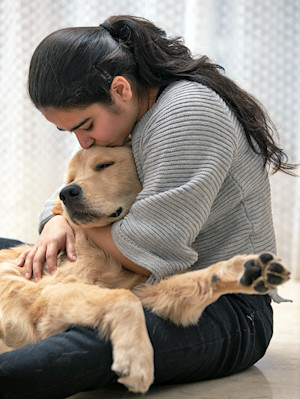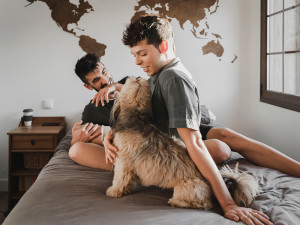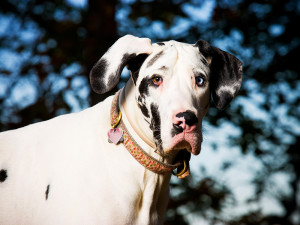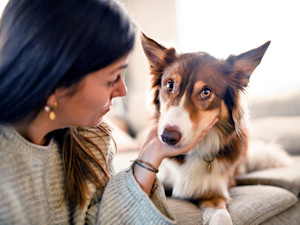Why Is My Dog Farting So Much?
OK, this is getting a little excessive...

Share Article
In This Article:
Why Do Dogs Fart? Why Does My Dog Fart So Much and Stink? What Foods Give Dogs Gas? How To Stop Dog’s Smelly Farts
If you live with an adorable pooch who can clear a room with one silent fart, you know the struggle of living with a flatulence-prone dog. Whether we want to admit it or not, humans and dogs have much in common when it comes to passing gas, and there is a ton of variation between individuals.
Some dogs are perpetually gassy while others may only occasionally fart. Some dogs may have audible farts that are not especially stinky, while others can bring tears to your eyes. Read on to learn more about what makes some dogs fart more than others and what you can do about it.
Why do dogs fart?
If you are cohabitating with a dog with smelly farts, it may be difficult to imagine a world where your dog doesn’t fart all the time, but it is possible. To some degree, farting is a natural and normal part of digestion. As food makes its way through the digestive tract, it is broken down into digestible components that are then absorbed through the intestines.

The non-digestible parts continue through the digestive tract to the colon where they are further broken down by bacterial fermentation. Fermentation results in gas formation which leaves the body in the form of a fart. Therefore, every single dog farts, but it may not be especially frequent, or stinky. So, if you’re wondering, why do my dog’s farts smell so bad? There are many variables to consider, and there are many points along the digestive process that can influence how gassy a dog is, and how stinky that gas will be.
Why does my dog fart so much and stink?
The short answer to a dog’s smelly farts are almost always a digestive issue. It may be as simple as something funky they ate, or their overall lifestyle, but other times there may be a more specific culprit related to a medical condition. This includes:
Diet changes: Most dogs eat the same exact thing every day, all day, for months or years on end. Keep this in mind if you plan to change their diet or offer up a new snack. Their digestive tract becomes accustomed to a certain formula, and a sudden change can really upset their flow. New foods can be harder to digest, leading to more undigested products making their way to the colon where they ferment and produce those really bad dog farts.
Swallowing too much air: This mostly results in excessive burping, but some swallowed air can make its way south to be excreted as a fart, too. Swallowing air often happens when dogs eat quickly and swallow their food without chewing. It can also happen when dogs are stressed or nervous and are breathing more quickly than normal.
Breed predispositions: Brachycephalic dog breeds, including French Bulldogs, Boston Terriers, Boxers, and Pugs, are known for being especially gassy. This may be caused by their breathing difficulties, which result in more mouth breathing and swallowing additional air. It is also often related to other digestive problems that are common in these breeds.
Eating spoiled food: Dogs that like to sample the garbage, cat litter, or trash on the street are more likely to eat contaminated foods that may contain bacteria, viruses, or parasites that can cause digestive upset. This can lead to excessive gas in addition to vomiting, diarrhea, or even intestinal blockages.
Too much fiber: Fiber is an indigestible carbohydrate that has many health benefits. At the same time, because it is indigestible, it makes its way to the colon where it may be fermented by bacteria there. This can lead to excessive gas, especially for dogs that are not accustomed to eating lots of fiber.
Underlying medical problems: Many illnesses, especially digestive problems, lead to excessive gas in addition to other signs. This includes short-term problems like infections, pancreatitis, or intestinal parasites. It can also include chronic conditions like food allergies, inflammatory bowel disease, other autoimmune conditions, cancer, or congenital problems like exocrine pancreatic insufficiency. Anytime gas is accompanied by other signs of illness, you should see a vet right away.
Medications: Certain medications, especially opioid pain medications and drugs used in anesthesia, slow down the movement of the digestive tract. This can lead to inefficient digestion, resulting in more undigested food making its way to the colon to ferment.
What foods give dogs gas?
Many foods have the potential to ignite your dog’s smelly farts. This varies from one dog to another depending on their diet and specific sensitivities such as:
New foods: New foods are always a gamble. A dog may be particularly sensitive to something in the new food, or it may just take time for them to get used to eating it. It is best to introduce new foods in small amounts, very gradually, to avoid digestive upset.
High-fiber foods: Because fiber is indigestible, foods that are higher in fiber will lead to more fermentation in the colon. This includes most fruits and vegetables and legumes like beans and lentils. It is worth noting these foods have many health benefits and over time, they can influence the kinds of bacteria in the gut for the better. If they are introduced in small amounts, gradually, dogs can adjust to them without being overly gassy.
High-fat and high-protein foods: Excess fat and protein that make their way to the colon will ferment and release especially foul-smelling byproducts. While both fat and protein are critical nutrients for dogs, you shouldn’t give them high-fat or high-protein foods they are not accustomed to, or in excess. Some dogs are also especially sensitive to fat in their diet and should avoid all high-fat foods.
Allergens: Dogs with food allergies or sensitivities may be more gassy when they consume those ingredients. This is because allergies create inflammation within the gut, which also slows digestion and reduces absorption of nutrients. This can lead to more undigested products entering the colon and fermenting. There are almost always other signs of a food allergy in addition to gas so be on the lookout for any other abnormalities.
Milk and dairy products: Most dogs are lactose intolerant and cannot digest dairy products. This leads to additional undigested products entering the colon and fermenting. Dairy products can also cause other signs like diarrhea and painful cramps, so it is best to avoid it altogether.
Table foods: Table scraps are often the perfect blend of unusual foods that your dog hasn’t tried before, combined with ingredients that are more likely to cause digestive upset like high fat oils, butters, or dairy products. They may even contain additional ingredients that are unhealthy or toxic. All of these variables make them a likely culprit for digestive upset and gas.
How to stop dog’s smelly farts
The good news is that there are a lot of ways you can trouble-shoot at home to try to resolve your dog’s smelly farts. It is important to only make one change at a time so you can see what works and what doesn’t. If you make a change, wait about a month before changing anything else to allow enough time to see results. Some ideas to consider are:
Consistent diet: Stick with one dog food and eliminate treats and table scraps at first. Be sure to feed your dog at consistent times each day and keep the meals small. Multiple meals per day are easier to digest than one large meal each day. If your dog’s gas improves, you can gradually re-introduce one treat at a time.
Probiotics: You can add in a probiotic to your dog’s daily routine to establish good microbes in their gut. This can change how fermentation happens and influence the odor of your dog’s farts.
Slow feeding: Take steps to slow your dog down when they are eating. This will reduce how much air they swallow and prevent them from gulping their food without chewing. You can do this by feeding smaller, more frequent meals and using tools like slow feeders and puzzle feeders as well.
Regular exercise: Regular exercise improves general health in numerous ways, including digestion. Exercise helps to improve motility within the digestive tract, moving food through the body more quickly and reducing the amount of fermentation that occurs. Be sure to increase exercise gradually to avoid injuries in dogs, and schedule feedings a few hours before or after exercise to avoid interfering with ongoing digestion.
Introduce new foods gradually: If you are concerned that your dog’s diet is the problem, or you want to add more fiber to your dog’s diet, be sure to make these changes slowly. Diet changes should be introduced over the course of a week by slowly mixing small amounts of the new food in with their previous diet. Increase the proportion of new food gradually each day until you are feeding your pup only the new food.
Consult a vet: If you’ve tried lots of modifications and your dog still has the stinkiest farts, you should consult a vet to check for underlying medical causes. This is especially important if your dog has any other signs of illness including vomiting, diarrhea, finicky appetite, poor weight gain, lethargy, or bad breath.
Bottom line
If your dog has foul-smelling dog farts, there are many possible causes.
You can try making modifications to your dog’s diet and lifestyle to improve the frequency and odor of their farts.
If your dog has other signs of illness, it is important to see a vet for a comprehensive exam and diagnostic testing.
References
Jones, BR, et al. “Flatulence in Pet Dogsopens in new tab.” New Zealand Veterinary Journal, vol. 46, no. 5, 22 February 2011, pp. 191-193.
Kane, Ed. “Flatulence in Dogs; Annoyance or Sign of GI Illness?opens in new tab” DVM 360, 1 January 2015.
Yamka, Ryan, et al. “In vivo measurement of flatulence and nutrient digestibility in dogs fed poultry by-product meal, conventional soybean meal, and low-oligosaccharide low-phytate soybean mealopens in new tab.” American Veterinary Medical Association, vol. 67, no. 1, 1 January 2006.

Dr. Amy Fox, DVM
Amy Fox, DVM is a small animal veterinarian in New York City with over thirteen years of experience in a mixture of general practice, emergency medicine, and shelter medicine. A lifelong animal lover, Dr. Fox studied biology in college and then worked as a veterinary nurse before pursuing veterinary school at Cornell University. Her expertise includes surgery, dentistry, and management of chronic conditions, and she is interested in toxicology, pain management, nutrition, care of senior pets, and educational outreach. Dr. Fox also enjoys writing about veterinary medicine and teaching, and her work has previously appeared in Spruce Pets. In her free time, she loves to cook, garden, go for long runs, and hang out with her goofy mixed-breed dog May, who provides never ending comic relief!
Related articles
![Same sex couple with their dog lying on the bed laughing at his farts]()
Why Do Dogs Fart? Causes and Remedies for Dog Flatulence
Expert solutions for your pup’s unfortunate flatulence.
![White and black spotted Great Dane with two different colored eyes looks into the camera]()
Here’s How You Can Prevent Dangerous Bloat in Your Dog
Bloat is one of the leading causes of death in deep-chested dogs. This elective surgery can lower the risk.
![Woman staring at her dog on the couch.]()
6 Reasons Why Your Dog Might Still Stink Even After a Bath—and How to Fix That
If a bath won’t freshen them up, what will?
![Woman looking at pills for her dog at veterinary clinic.]()
Can I Give My Dog Pain Medication?
No, you should not give your dog over-the-counter pain medication for humans.
Why Do My Dog’s Farts Smell So Bad?
Well, for one thing, you should know about “garbage gut.”
Can Dogs Get a Stomach Bug?
No one likes it when their tummy hurts.







